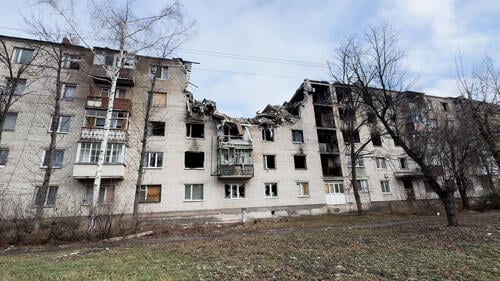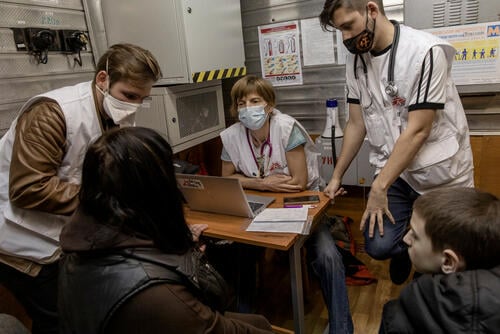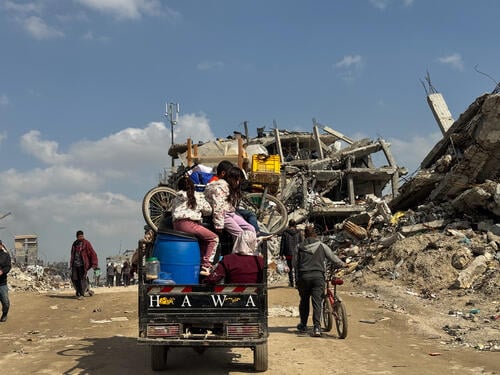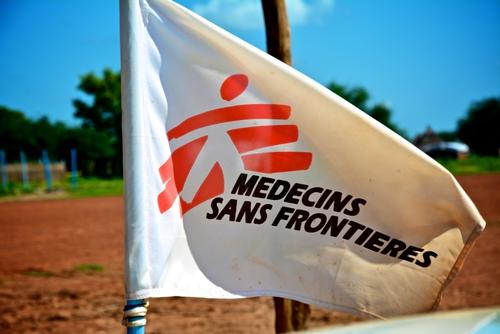In eastern Ukraine, Dobropillia, Donetsk oblast (region) — less than 20 kilometres from the frontline — has recently faced some of the worst shelling since the escalation of the war in 2022. As attacks continue, Médecins Sans Frontières (MSF) teams are working to ensure urgent medical care is available to those caught in the violence.
“We hear heartbreaking stories from our patients,” says Oleksandr Makarevych, MSF Emergency Manager in Ukraine. “People tell us how they ran out of burning houses. Some were trapped inside their flats as the fire spread and couldn’t escape. One woman told us that her neighbours died in the bathroom, where they tried to hide during the attack.”
A former city of refuge now faces frequent attacks
Dobropillia, a city of miners and farmers, was once home to almost 40,000 people. Now, only 20,000 people remain, despite the growing danger. Because of its location, war-wounded and vulnerable people from nearby towns — including Pokrovsk, Myrnohrad, and Kostiantynivka — were evacuated to Dobropillia for emergency medical care. However, now the city is under constant threat.
We hear heartbreaking stories from our patients. People tell us how they ran out of burning houses. Some were trapped inside their flats as the fire spread.Oleksandr Makarevych, MSF Emergency Manager in Ukraine
“People are living under permanent stress,” says Thomas Marchese, MSF Programme Director in Ukraine. “Missile attacks have become more frequent. When sirens go off, people have only seconds to reach shelters — and many elderly people, people with disabilities, or families with children cannot make it in time.”
“Even in basements, they are not completely safe. If a building collapses, people could be trapped under rubble,” says Marchese. “For the past three years of full-scale war, we’ve witnessed these devastating consequences repeatedly — in Donetsk region, Sumy, Dnipro, Kharkiv, and Zaporizhzhia.”
MSF assisting in medical evacuations
Since 2022, MSF ambulances have been working closely with Dobropillia’s hospital, helping to transport patients to safer facilities further from the frontlines. Following the massive attack at the beginning of March, which killed 11 people and injured at least 50, MSF ambulance teams referred 25 patients from Dobropillia to hospitals in Dnipro, five of whom were in critical condition.
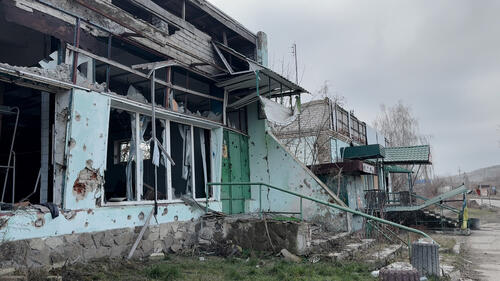
Among those evacuated was a woman suffering severe burns to her face and eyes, along with blast injuries and head trauma. She and her husband had briefly left Dobropillia to stay with relatives in Dnipro but returned home to collect belongings — when shelling began.
“There were so many wounded that even the hospital corridors were filled with patients,” says Serhii Tkachenko, MSF feldsher.1 “[The patient’s] oxygen levels were dangerously low, so we transported her with oxygen support.”
Another patient was a young man with an open fracture to his leg, as well as blast injuries, head, and chest trauma.
“He ran to help others after the first explosion but was injured when more shells landed,” says Dr Hennadii Kyslytsia, an MSF doctor. “We managed his pain and monitored his vital signs during the referral.”
When sirens go off, people have only seconds to reach shelters — and many elderly people... cannot make it in time.Thomas Marchese, MSF Programme Director in Ukraine
Even if the war ends tomorrow, enormous needs will remain
What our teams see in Dobropillia is alarming: burned-out apartment blocks, scorched land, and desperate shortages of essential medicines and services. Local authorities continue to call on residents to evacuate. The nearest transit centre for displaced people is in Pavlohrad, Dnipropetrovsk oblast, where MSF mobile clinics also operate.
“Sometimes, patients arrive with severe injuries that were left untreated for two or three days,” says Marchese. “By the time they get to us, their condition is critical.”
MSF teams will continue to provide emergency care, evacuate the war-wounded, and support hospitals near the frontline. Even if the war ends tomorrow, the humanitarian and medical needs in Ukraine — especially in conflict areas — will remain enormous. People will need housing, access to medical care, and psychological support to recover from trauma and stress.



